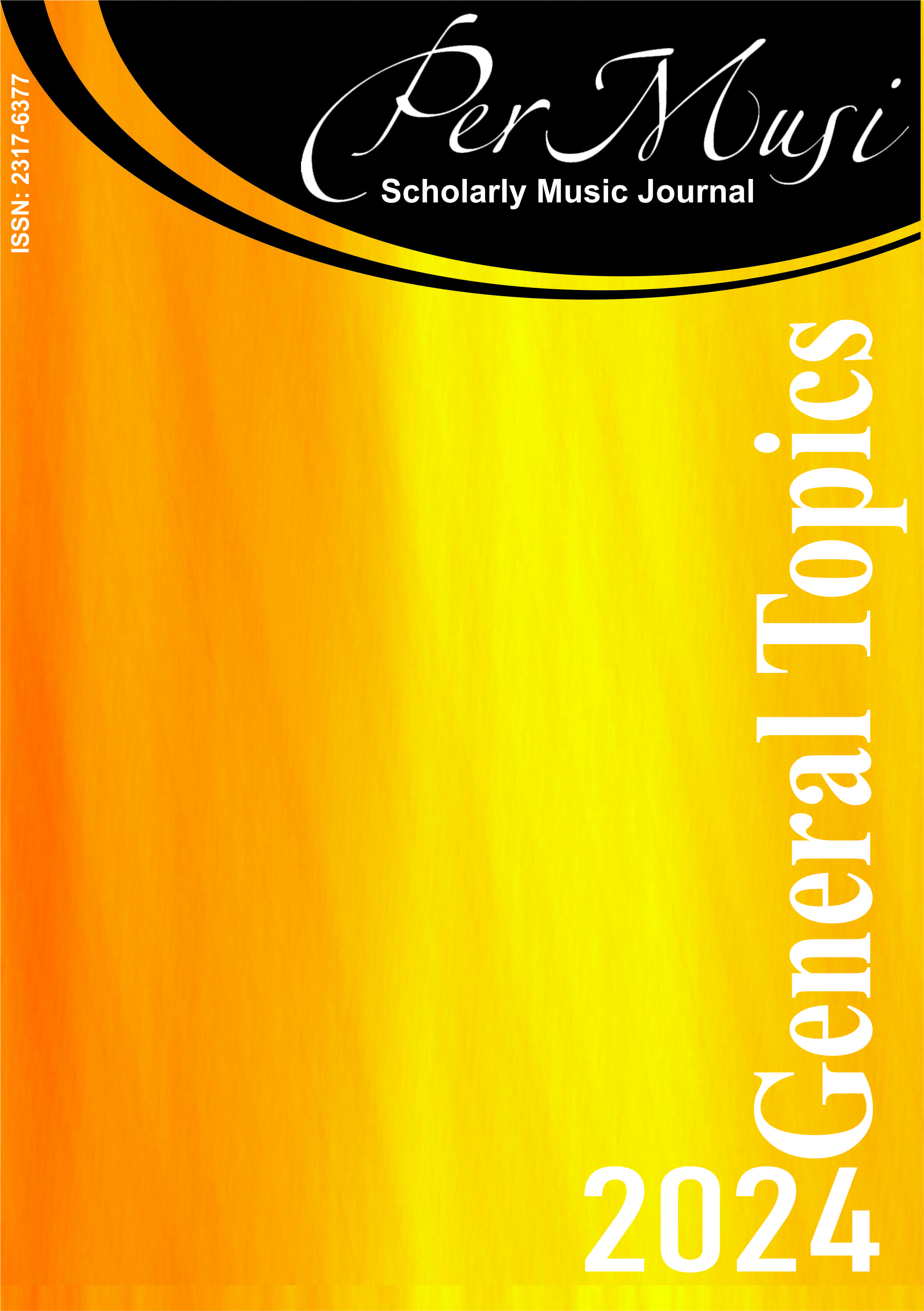Juego Musical Dados Magicos
una herramienta didáctica que proporciona apoyo lúdico para la enseñanza del instrumento
DOI:
https://doi.org/10.35699/2317-6377.2024.48426Palabras clave:
juego, musica, satisfaccion, instrumento, aspectos tecnico-interpretativosResumen
Este trabajo analiza el desafío del profesor de música al involucrar al estudiante en las clasesy en la práctica individual. Se utilizaron referentes teóricos de filósofos como Huizinga, Piaget y
Callois para abordar el juego y su relación con la música; y metodologías relativas a la práctica del
instrumento de teóricos como Suzuki, Tania Carey, Karen Tuttle y Primrose para sustentar decisiones
sobre los aspectos técnico-interpretativos del violín, la viola y el violonchelo. Con el objetivo de
hacer más interesantes las clases y el estudio diario y mejorar los aspectos técnico-interpretativos
del instrumento, el juego Magic Dice propone la práctica en una realidad lúdica, permitiendo al niño
mejorar su desempeño y lograr satisfacción al tocar. Después de usar los Dados, se puede ver el progreso
en la afinación, el sonido y la postura del alumno. Además del crecimiento en la sociabilidad,
interacción y vinculación entre alumno, instrumento y docente.
Referencias
Callois, Roger. 2021. Os jogos e os homens: A máscara e a vertigem. Petrópolis: Editora Vozes.
Carey, Tanya L. 2007. Tocar chelo es fácil - Primera Parte: Calientamiento. Chicago: Carey Works Inc.
Dalton, David. 1988. Playing the Viola: Conversations with William Primrose. Oxford: Oxford University Press.
Dane, Matthew. 2002. “Coordinated Effort: A Study of Karen Tuttle’s Influence on Modern Viola Teaching.” PhD diss., Rice University.
Dew, Robert. 1993. “In Response to Instinct.” The Strad 104 (1241): 835-838.
__________. 1993. “Instinctive Responses (2).” The Strad 104 (1242): 936-940.
__________. 1995. “Technique Without Tension.” The Strad 106 (1265): 934-939.
__________. 1995. “Technique Without Tension- Part 2.” The Strad 106 (1266): 1060-1063.
Duffy, Mary E. 1987. “Methodological triangulation: a vehicle for merging quantitative and qualitative research methods.” Journal of Nursing scholarship 19 (3): 108-159.
Fischer, Carl. 2020. The Karen Tuttle Legacy: A Resourse and Guide for Viola Students, Teachers and Performers. New York: Carl Fischer Music.
Huizinga, Johan. 2019. Homo ludens: O Jogo como elemento da cultura. São Paulo: Editora Perspectiva.
Godoy, Arilda S. 1995. “Introdução a pesquisa qualitativa e suas possibilidades.” Revista de Administração de Empresas 35 (2): 57-63.
Manning, Peter K. 1979. “Metaphors of the field: varieties of organizational discourse.” Administrative Science Quaterly 24 (4): 660-671.
Maanen, John van. 1979. “Reclaming qualitative methods for organizational research: a preface.” Administrative Science Quaterly 24 (4): 520-526.
Moss, Kirk D. 2006. “Favored Sound Production Exercises of Selected Violin, Viola, Cello, and Double Bass Pedagogues: An Analysis and Adaptation.” PhD diss., University of Florida.
Piaget, Jean. 1978. A formação do símbolo na criança. Imitação, jogo e sonho imagem e representação. Barueri: Guanabara Koogan.
Pope, Catherine, and Nick Mays. 1995. “Reaching the parts other methods cannot reach: an introduction to qualitative methods in health and health service research.” British Medical Journal 311: 42-45.
Primrose, William. 1978. Walk on the North Side: Memoirs of a Violist. Provo: Brigham Young University Press.
Reiter, Emmanuella. 2008. Karen Tuttle’s Heritage: The Theory and Practice of Co-ordination. London: Emmanuella Reiter.
Reiter-Bootiman, Emmanuella. 2011. “In Memoriam: Karen Tuttle 1920-2010.” The Strad 122 (1451): 30-31.
Riley, Maurice. 1980. The History of the Viola. Ann Arbor: Braun-Brumfield.
Descargas
Publicado
Número
Sección
Licencia
Derechos de autor 2024 Per Musi

Esta obra está bajo una licencia internacional Creative Commons Atribución 4.0.

Excepto cuando se indique lo contrario, el contenido de este sitio está sujeto a una Licencia Creative Commons - Atribuição 4.0 Internacional.












